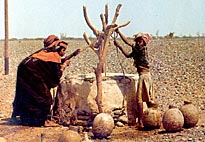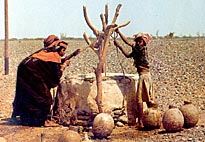
Women in Tihama: Cultural & Traditional Contributions [Archives:1999/28/Culture]
July 12 1999
#7 in a Series:
The Tihami woman, like her sisters in different parts of Yemen, has contributed effectively to the literary and cultural traditions of her community. These contributions appear most in the folk songs and tales that form an important part of Yemen’s social culture. What I want to display in this article is some of these inherent cultural traditions that very much affect the woman in Tihama.

Women in Tihama, especially in the countryside, are the partners of men in different activities, primarily in agriculture. She helps in plowing, harvesting, bringing food from the house, etc. This is obviously not an easy task. Moreover, when the men come back home to rest, women in Tihama come home to perform more work. They have to take care of the house and children. While these women are performing all these tasks, they will often, and in a very spontaneous way, start humming and chanting some verses to pass time. Verse lines indicate the state of a woman who has lost her lover or her husband, or of a woman who is waiting for her lover to come. By repeating these lines, these women also provide a vent for their feelings and emotions. They can also sing some songs that match situations they are in.
Women in Tihama sit together some nights and have poetic competitions, in which a woman would start a line of one verse from a poem, and immediately the competition starts. Another woman takes the role of answering or replying to her friends verse line. Women in Tihama also participate in reviving the traditional and cultural tales. Some of these tales are being narrated in women’s meetings, such as the tale of the “Tihami pretty lady and the old man,” which is still spread in many of Tihami districts. The story says that there is an old man whose name is Salem. He came on foot from a far village to Tihama. On his way he became very thirsty.
He could see a well, and therefore he came nearer in order to get a drink. As he comes near, he sees a very attractive girl. He becomes surprised, and does not stop himself from coming close. When the girl becomes aware of the old man, she goes to the other side of the will to let him drink. The old man asks her, using verse lines, to give him some water. He goes on praising her magnificent beauty and attractiveness, saying that if he had power and wealth and saw her, he would distribute silver to all the people of Alhigaz and the people around it in order to obtain her love. She is very bashful and modest, and she asks him to drink and then to go on his own way, and says if he becomes sick, he should buy himself a donkey. This humble and modest reply makes the old man become ashamed of himself, and he goes on his way. Since then, the well has been called after his name, “Beer Salem,” Salem’s well. In fact, the traditional literary output in Tihama is vast and gorgeous, and women constitute an important part of it. This does not mean that they have broken loose from the traditions, but what we find is that these literary and cultural traditions and folklore are still passed on from one generation to another.
Saleh Abduh Albaqi,
Cultural Editor
——
[archive-e:28-v:1999-y:1999-d:1999-07-12-p:./1999/iss28/culture.htm]


